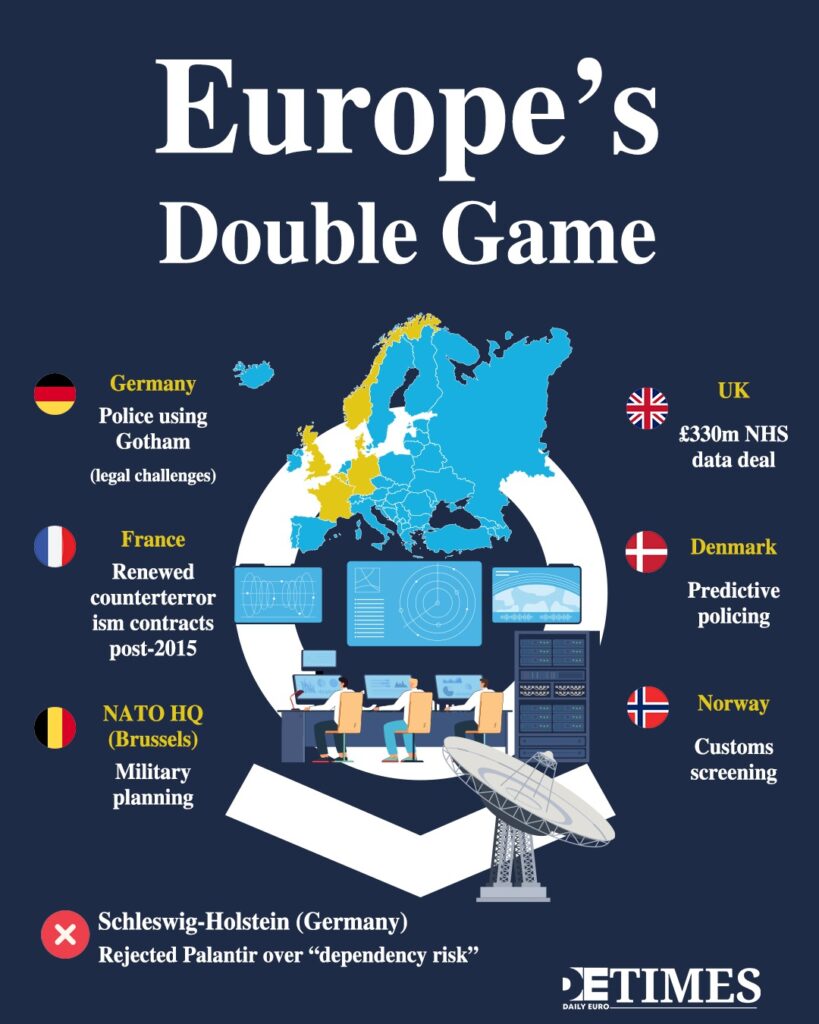Europe’s push for tech independence clashes with its growing reliance on Palantir: a U.S. firm mired in controversy. The company, founded by Peter Thiel and backed by CIA-linked investors, sells data tools to governments and militaries.
While Berlin debates the legality of Palantir’s police software, France and NATO already use its systems for counterterrorism and war planning.
This contradiction exposes a rift: Europe wants autonomy but keeps outsourcing critical infrastructure to a company accused of enabling mass surveillance and deportation in the U.S.
Why Palantir Divides America
Palantir’s rise in the US stems from its work with immigration enforcement and the Pentagon. Its AI platforms, Gotham and Foundry, power deportations and military strikes, drawing ire from civil rights groups.
Former employees condemn its ties to the Trump administration, warning its tools could “normalise authoritarianism.”
CEO Alex Karp's rhetoric, boasting of technology that "scares enemies [and] kills them," fuels distrust. Yet, Palantir thrives, with US revenue jumping 68% in 2025, driven by contracts like a $10 billion Army deal.
Influence Beyond Tech Boardrooms
The company’s influence extends beyond technology.
Palantir’s lobbying spending has quadrupled since 2019, reaching $5.8 million annually.
Executives, including Trump allies like Peter Thiel and JD Vance, now hold key government roles, blurring lines between corporate and state power.
Critics argue this "revolving door" undermines democratic oversight, especially as Palantir's software consolidates data from agencies like ICE, the IRS, and the Pentagon into a single surveillance system.
Europe’s Double Game
European leaders preach sovereignty but sign deals with Palantir. Germany’s Christian Democrats back police use of Gotham, despite lawsuits over its opaque data handling.
France renewed contracts after the 2015 ISIS attacks, though Europol once considered suing Palantir for faulty analytics. Even NATO, a bloc wary of US tech dominance, chose Palantir for military planning.
The irony is thick: Europe resists US cloud giants but embraces a firm accused of eroding privacy.
The UK's £330 million NHS contract with Palantir highlights the stakes. Activists warn the deal risks exposing patient data to a company with ties to US intelligence.
Similar concerns plague Denmark’s predictive policing project and Norway’s customs screening, both powered by Palantir 4. Meanwhile, Schleswig-Holstein rejects Palantir, calling it a “new dependency”.
This patchwork approach reveals Europe’s lack of a unified strategy, opening doors to US tech while lamenting lost sovereignty.

The Sovereignty Mirage
Defenders argue Palantir fills gaps Europe’s tech sector can’t.
Its AI tools outperform homegrown rivals whilst crises, like Covid-19 or the Ukraine war, demand quick fixes. Yet this short-term thinking ignores long-term risks. Relying on a US company tied to Trump-era policies undermines Europe’s regulatory ethos.
When Schleswig-Holstein rejects Palantir to avoid “new dependencies,” it shows alternatives exist if political will follows.
The deeper issue is strategic. Palantir’s expansion mirrors broader US tech dominance, where European agencies become “digital colonies”.
The EU’s failure to enforce GDPR on Palantir’s opaque data practices exemplifies this imbalance. While Brussels negotiates data-sharing deals with Washington, Palantir’s contracts with Europol and the NHS operate in legal grey zones, often shielded by national security exemptions.
A Call for Real Independence
Europe must choose: double down on sovereign tech or keep feeding Palantir’s expansion.
Investing in firms like Ireland’s Siren, which positions itself as a Palantir alternative, would align with EU data laws. Letting US tools dominate critical sectors is a gamble Europe can’t afford.
Keep up with Daily Euro Times for more updates!
Read also:
Big Tech Immoderation: Europe’s Digital Reckoning
Britain Must Build Defence Tech at Home
EU at an Impasse: Political Realism Over Moral Clarity






